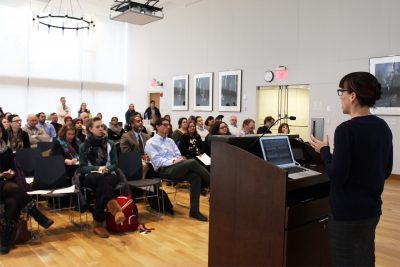
Approximately 50 Boston University students and faculty gathered at Barrister’s Hall in the BU School of Law Wednesday evening to listen to a series of presentations about mass incarceration research and discuss its impacts.
Ten BU researchers presented during the event, each spending three minutes discussing their past or ongoing research on mass incarceration. The presentations ranged in focus from mass incarceration of substance users to peer support for veterans leaving incarceration.
Jessica Simes, a sociology professor at BU, organized the panel.
“Mass incarceration had far-reaching implications for social and economic mobility, for families and children, and for the quality of American democracy,” Simes said after the presentation. “I hope that audiences could understand the far-reaching impacts of mass imprisonment and see the interdisciplinary nature of mass imprisonment research.”
This panel was part of BU’s “Research on Tap” series. Each panel is led by a BU faculty member who invites a group of researchers to present on a specific topic. Simes said the goal of the series is to allow students and faculty to learn from and collaborate with one another.
Megan Sullivan, associate dean of Faculty Research and Professional Development, spoke about her research on how children were impacted in the age of mass incarceration.
“2.7 million minor children have one thing in common: incarcerated parents,” Sullivan said. “Yet each of these children has underneath peculiarities. It is our researchers’ challenge and privilege to discover what each child needs and how we can help.”
Danielle Rousseau, a professor of social sciences, spoke about her research on the disparities and intersectionalities in mass incarceration. She said that when the interactions between race and gender were taken into account, there was a complex spectrum of disparities in mass incarceration.
“On one end, we see very harsh punishment of black males in the system: they have longer prison sentences and are more likely to be incarcerated,” Rousseau said. “However, on the other end of the spectrum, we see black women are least likely to be incarcerated and got shorter prison sentences.”
Rousseau stressed the importance of taking a holistic approach when researching gender disparities in mass incarceration.
“If we don’t look into the details, we lose the intricacies,” Rousseau said.
She said cultural assumptions are a major cause of these disparities in the criminal justice system.
“Judges are using stereotypes based on understandings of the collateral consequences, based on communities, and based on gender norms assumptions,” Rousseau said. “And they are using this as a means of decision-making and bringing about the criminal justice process in an overtaxed system.”
Phillipe Copeland, a professor in the School of Social Work, was the last presenter of the evening. He spoke about the importance of ending mass incarceration.
“Mass incarceration murders minds — we can’t breathe,” Copeland said. “Mass incarceration is more than a mere number, it’s truly a matrix of interconnected beliefs, values and social systems.”
He said the criminal justice system often times makes things worse for the incarcerated, rather than helping rehabilitate them.
“The mentality of mass incarceration includes the implicit biases toward the psychologically criminalized people because of the groups they are perceived to belong to,” Copeland said. “People are turned into ‘those people.’”
Copeland said mass incarceration normalizes dehumanization and violence.
“There can be no half measures with mass incarceration,” Copeland said. “We need abolition today, abolition tomorrow, abolition forever.”
Several graduate students who attended the panel said they appreciated the range of perspectives the presentations offered.
Lauryn Claassen, a first-year graduate student in the School of Public Health, said she thought the panel was a good way to reflect on what’s happening in the field of criminal justice.
“These [changes in mass incarceration] all happen so fast that we kind of need a thought period to take it all in,” Claassen said.
Madeline Bishop, a first-year graduate student in SPH, said she was especially interested in the impacts of mass incarceration on adolescents.
“I work with a program of evaluation for juvenile justice and mental health,” Bishop said. “I’m really interested in ways that adolescents are contributing or hopefully being alleviated from this cycle of mass incarceration.”
Katherine Valles, a first-year graduate student in the School of Medicine, said she attended the event to find inspirations for her Master’s thesis.
“It was cool to see all the different topics that people are researching about,” Valles said. “The ‘Old Wine, New Bottles: Community Reintegration For Prison Populations’ was probably my favorite presentation because it inspired me to look more into community mass incarceration.”


















































































































